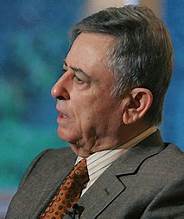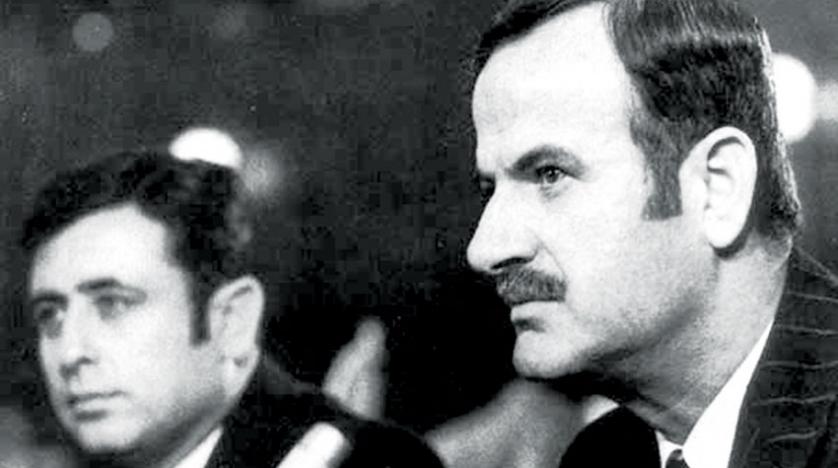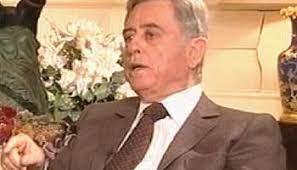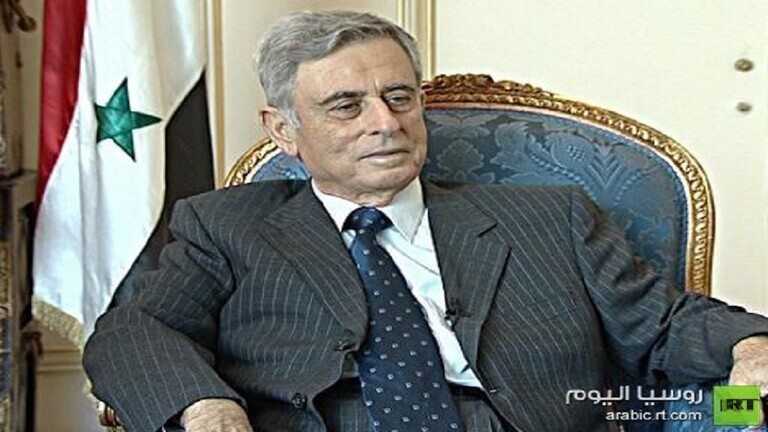He stated that Bashar al-Assad and his associates used to launder money from the Iraqi regime in Lebanon,
inside his house near the Arc de Triomphe, in the heart of the French capital, Paris. “Al-Masayah” interviewed Abdel Halim Khaddam, who possesses the most intimate knowledge of the Syrian file and implicates Presidents Hafez and Bashar Al-Assad. Khaddam served as their deputy and foreign minister, responsible for two of the Middle East’s most dangerous and enigmatic issues: the Lebanese file and the Iraqi file. During the “evening” session, Abdel Halim Khaddam openly divulged the secrets regarding his involvement with the deeply corrupt and tyrannical regime. He recounted Hafez al-Assad’s relentless pursuit to ensure the inheritance of power for his family members and Bashar al-Assad’s attempts to suppress him. He commenced criticizing his father’s regime, referring to him as “My Uncle Abdel Halim.” Additionally, he reminisced about the moment he unexpectedly assumed the presidency of the republic following Hafez al-Assad’s demise, the scenes of amending the constitution to facilitate Bashar’s presidency, and his decision to leave Syria and become the regime’s fiercest adversary. According to Khaddam, the regime was plotting to establish a state in the Sahel region, where the majority of Alawites, who are associated with the Assad family, reside. Furthermore, Abdel Halim Khaddam discussed his interactions with Hassan II and Mahdi Benbaraka and how Syria’s stance shifted concerning the Sahara issue. He stated that Algerian President Abdelaziz Bouteflika did not stray far from the thoughts of his predecessor, Houari Boumedien.
It has been rumored that you were granted the stay in the villa (where the dialogue took place in Paris) by the late Rafiq Hariri’s wife, in exchange for providing testimony before the International Commission of Inquiry regarding the involvement of the Syrian regime in his assassination.
This claim is completely false, regardless of its proximity or remoteness to the truth. When we purchased this house in 1982, I had no knowledge of Rafiq Hariri. It was acquired by three of my sons who were working in Saudi Arabia at the time—two engineers and a doctor.
- Is it true that your son Jamal defrauded a Saudi businessman and embezzled 5 billion dollars through a fraudulent company?
Absolutely not. My son Jamal resides and works in Saudi Arabia and has never left the country. He also holds Saudi nationality. These false accusations are propagated by Bashar al-Assad’s regime. I challenge anyone, both within and outside of Syria, to produce this alleged Saudi individual or provide evidence that any member of my family possesses any ill-gotten wealth.
- Have you ever met Maher Al-Assad, Bashar’s brother, who is associated with the suppression of protests and killing of protesters?
No, I am not acquainted with him.
- How is that possible?
He has never met me, not even once. As a vice president, I am currently in the stage of enjoying my grandchildren’s presence. I do not engage in babysitting children or teenagers. I have been declining to meet with Bashar for two years because he was child during my tenure and I have a relationship with his father, so I chose not to receive him.
- Does he actively seek a meeting with you despite your refusals?
Yes, and his meeting with me was arranged through intermediaries such as Ghazi Kanaan (Minister of Interior), Ibrahim Safy (Deputy Minister of Defense), and Ezzeddin Nasser (President of the General Federation of Trade Unions in Syria). I agreed to meet him under the condition that it be at my residence rather than in an official capacity.
- Was this to ensure confidentiality?
No, it was to avoid giving the meeting a formal and official nature.
- How was the relationship between your children and Hafez al-Assad’s sons?
They had a relationship with Bashar as they were colleagues. My youngest son, Bassem, was his classmate. Additionally, my two sons, Jihad and Jamal, were friends with Bashar due to their shared generation.
- Is it true that Bashar was a good and humble boy during his childhood and early youth?
He was indeed polite and well-mannered. However, it became apparent after assuming power that this demeanor masked his mentality as a ruthless dictator.
- When Bashar Al-Assad used to visit your house to see your children, and later when you received him, how did he address you?
He referred to me as Uncle.
- Did he continue calling you Uncle even after you worked with him as president?
Yes, he continued to address me as Uncle, and sometimes as Abu Jamal.
- Do you have any doubts about the circumstances surrounding the death of Basil Al-Assad?
No, he passed away as a result of a car accident.
- There are claims that Bashar Al-Assad’s brother, Maher Al-Assad, who commands the 4th Tank Division, dictates the security policy to Bashar and is primarily responsible for the atrocities committed in Syria. Is there any truth to this?
No, nobody dictates anything to Bashar Al-Assad. Maher works under his command.
- Is Anissa Makhlouf, Bashar Al-Assad’s mother, the one who holds all the power in Syria?
She is a poor woman without the personality to exert any control, not even over her own children.
- Have you had conversations with her?
Certainly, I have had numerous conversations with her, and I am familiar with her.
- Can you provide some background information about her?
She was a student at the Nuns School in Banias. She married her cousin Hafez. It is unfair to accuse her of leading Syria from behind the scenes.
- Can you share any details about the alleged incident involving Maher Al-Assad shooting Asif Shawkat, the husband of his sister Bushra?
I have no knowledge or information about that incident.
- How did you become the second most powerful person in Syria?
When I heard these rumors, I had already been outside of Syria for five years. I have no interest in entertaining such absurd discussions.
- According to one of the “Wikileaks” documents, it was mentioned that Bashar Al-Assad is willing to sacrifice his sister’s husband, Asif Shawkat, at any time to enhance his image.
- I cannot confirm this.
What I do know is that Bashar has a strong relationship with his sister Bushra and his brother Maher. However, the Syrian people are not concerned about whether Bashar loves or dislikes his sister’s husband. Their main focus is finding ways to rid themselves of the entire regime.
- Did Maher Al-Assad actually engage in contracts with Uday, the son of Saddam Hussein, to smuggle Iraqi oil and sell it on the black market?
There was a group associated with Bashar al-Assad that established contracts for smuggling oil from Iraq.
- Was this collaboration coordinated with Uday Saddam Hussein?
It was done in collaboration with Uday and the Iraqi regime. Saddam Hussein instructed those around him to purchase Syrian goods. If they found any corruption, they were instructed to destroy them. As a result, the ruling class surrounding Bashar al-Assad had opportunities to form a commercial lobby with Iraq, which led to the accumulation of significant wealth.
- During that time, there were reports of money laundering operations involving Iraqi funds in Lebanese banks under the guise of Syria.
Such information was widespread, but I cannot personally verify it. However, it is not uncommon for money smuggling and laundering operations to occur in Lebanon, and they were supervised by the group surrounding Bashar al-Assad and his relatives.
Rifat Al-Assad claims, “Uncle Bashar still enjoys the support of people in every village and city in Syria, and they are urging him to return to power. What is your opinion on this?”
Rifat Al-Assad is merely dreaming, and I believe that if he were to return to Syria after the regime’s downfall, he would be held accountable and imprisoned.




